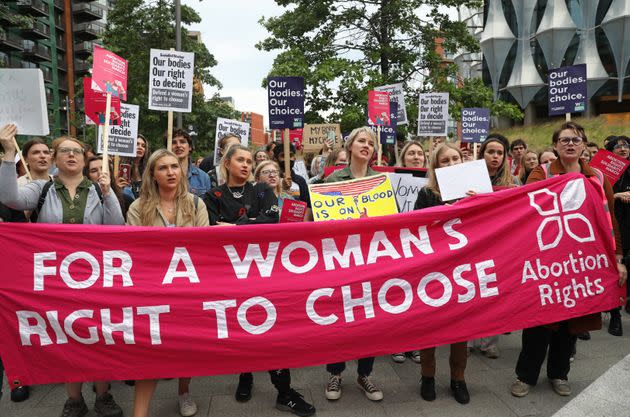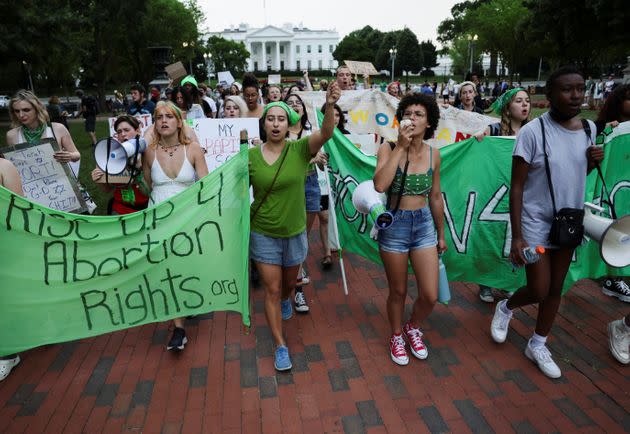Abortion Rights: What Does The US Ruling Mean For The UK?

Demonstrators outside the US embassy in London to protest against the decision to scrap constitutional right to abortion. (Photo: Ashlee Ruggels via PA Wire/PA Images)
The absolute right to terminate a pregnancy was overturned in the US on Friday.
The astounding news was first leaked back in May when the Supreme Court was first considering it, and it has now passed into law.
While this technically only impacts the States, the implications have left people all over the world – particularly in the UK – reeling.
Here’s why the landmark decision across the pond could affect Brits.
What is Roe v Wade?
Roe v Wade is the name of 50-year-old legislation in the US which enshrined the right to an abortion across the country.
Seven out of the nine Supreme Court judges backed the ruling back in 1973, which was hailed as a huge step forward for women’s rights.
It meant the 36 million women of reproductive age in the US could end a pregnancy during the first three months, although there were restrictions in place for abortions in the second and third trimester.
What happened to this ruling?
Five of the nine Supreme Court judges in the US have just overturned Roe v Wade.
The decision followed the court’s examination of a different case, Dobbs v Jackson Women’s Health Organisation, which took on Mississippi’s ban on abortion after 15 weeks.
The court ruled in favour of the state, effectively drawing an end to the right to have an abortion in the US in the process.
This means states now have no nationwide obligation to allow people to terminate pregnancies and can instead decide their own laws.
Thirteen have already passed trigger laws, meaning abortion is outlawed in those states, and a further 13 are expected to follow suit according to the think tank, Guttmacher Institute.
It’s very rare that the Supreme Court ever U-turns on its own legal ruling, and this situation hints at the current divide in the US.
President Joe Biden has condemned the ruling, and urged women in states where abortion is forbidden to travel to those where it was not.
Protests broke out when the ruling hit the news, with pro-choice supporters claiming the “illegitimate” move leaves women with two options: get illegal and unsafe abortions. or risk getting into debt by travelling elsewhere to receive the treatment they need.
As Dr Edward Morris, president of the UK’s Royal College of Obstetricians and Gynaecologists, said: “Limiting access to abortions won’t reduce the number of abortions happening, it will just make abortions less safe.”

Abortion rights supporters protest near the White House. (Photo: Evelyn Hockstein via Reuters)
Could this have other knock-on effects?
Yes – there’s a fear that removing Roe v Wade will become a gateway to more controversial legislation.
Following the overruling, one of the justices who championed overruling the right to an abortion, Clarence Thomas, wrote: “In future cases, we should reconsider all of this Court’s substantive due process precedents, including Griswold, Lawrence and Obergefell.”
This is a reference to three other landmark cases from the Supreme Court which enshrined the right to contraception, the repeal of anti-sodomy laws and the legalisation of same-sex marriage.
There are fears that rolling back abortion rights could prove a stepping stone for the Supreme Court to overturn a whole range of human rights in the US.
How has Downing Street reacted?
Prime minister Boris Johnson has dubbed the move a “big step backwards”, suggesting the introduction of similar legislation is not on the horizon for the UK.
Back in May, when the draft legislation to remove Roe v Wade was leaked, a No.10 spokesperson also said: “The UK fully supports women’s reproductive rights globally and including the right to access safe and legal abortion.”
What are the current abortion rights in the UK?
Women in the UK still have access to free and safe abortions for the first 24 weeks of pregnancy, and beyond for medical reasons.
But, two doctors also have to sign off on an abortion and it is not a legal right.
In fact, any women who ends a pregnancy without the legal authorisation of two doctors can face life imprisonment under a Victorian law passed in 1861.
In England, Scotland and Wales, you can get an abortion if there is a risk to the life of the pregnant woman, the threat of permanent injury to her physical or mental health, or risk of injury to any existing children.
An abortion is also permitted if a child carried to full term might have “such physical or mental abnormalities as to be seriously handicapped”.
In Northern Ireland, abortion is allowed on similar grounds as well as for any reason for the first 12 weeks of a pregnancy – two ruling which were only introduced in October 2019.
How many abortions happen each year in the UK?
A total of 214,256 abortions were reported in England and Wales last year, the highest since the Abortion Act was introduced in 1967.
This is an increase compared to 2020, when 210,860 were reported.
Abortions are particularly prevalent among areas where social deprivation is high – meaning as the cost of living crisis really kicks in, this number might just get higher.
Jonathan Lord, medical director at abortion provider MSI Reproductive Choices UK, told HuffPost UK: “The data shows abortion is an essential choice, and with continuing problems accessing contraception coupled with the cost of living crisis, we would not be surprised to see greater demand over the coming months.”
Has anything threatened this fundamental right in the UK?
Yes. The Department of Health tried to revoke at-home early medical abortions only earlier this year.
The government changed regulations during the first lockdown in March 2020 to allow women to have medical abortions at home after a phone or video consultation, with two pills to terminate the pregnancy sent via post.
The government then tried to end this legislation, making it return to pre-Covid arrangements in August, despite advice from experts at British Pregnancy Advisory Service and the Royal College of Obstetricians and Gynaecologists.
This was prevented only by a vote in the House of Commons, after MPs heard that since the ruling was introduced, 150,000 women had had abortions at home before they were 10 weeks pregnant.
There is still a lack of abortion services for the procedure in Northern Ireland, even though it has been legal since 2019.
Anti-abortion demonstrations have also been building outside UK clinics in recent years, leading doctors to call for a buffer zone to allow pregnant people a safe way into these buildings.
Why would the US have an impact here?
The US ruling can seem like it is a world away, but experts believe it will have an impact in the UK.
As Katherine O’Brien from the British Pregnancy Advisory Service said: “Anti-abortion groups in the UK work closely with their counterparts in the US, receiving funding and training.
“We are concerned that a perceived ‘victory’ for anti-choice groups in America will lead to to an escalation in clinic protests here.”
Another spokesperson from the service said: “At any given time, parliament could attempt to restrict women’s access.
“Over recent years, a number of anti-choice MPs have sought to do just that, and we must be constantly vigilant.”
Leader of the women’s equality party Mandu Reid also told HuffPost UK.“It is an outright assault on the rights of American women, threatening to deny 50% of the population their bodily autonomy.
“It has ominous consequences for women everywhere and is a reflection of the global backlash against reproductive rights.”
Writing in Refinery29, Vicky Spratt also outlined the warning signs for the UK.
“It tells us that the collection liberation of women and people with wombs is still perceived as a threat by a small but vocal and powerful minority of people who care little about the fact that their views no longer reflect those of society as a whole,” she wrote. “If a person’s right not to be pregnant is not safe, what is?”
So, what can we do?
While a YouGov poll from 2020 found nine of 10 UK adults are pro-choice, campaigners have encouraged people to speak out on abortion rights.
“The most important thing people in the UK can do to support abortion rights is to be loudly, unashamedly pro-choice,” the Abortion Support Network founder Mara Clarke told the Independent.
“The anti-abortion population is less than 10% of the UK’s population. We are the pro-choice majority, and we should speak often about not only abortion but about all reproductive health issues.”
Reid also told HuffPost UK: “What is happening in America is a warning to all of us, and must be a catalyst for abortion to be codified in law and health policies here in the UK as a matter of utmost urgency.”
MPs including Jess Phillips and Stella Creasy, have voiced their support for abortion rights too and calling for it to be decriminalised.
Tomorrow with sisters in UK parliament we will seek ways to assist with tragedy awaiting US women. In UK abortion rights have progressed but in almost all of UK, a woman's right to choose as I have done each time I was pregnant is still written in criminal law. This must change.
— Jess Phillips MP (@jessphillips) June 26, 2022
You think what you see in America couldn’t happen here? Then you don’t understand who is organising in UK politics. No one thought American Supreme Court would ever overturn a right previously granted either..
These attacks on womens rights won’t stop. Be prepared. #RoeVsWade— stellacreasy (@stellacreasy) June 24, 2022
This article originally appeared on HuffPost UK and has been updated.
Related...
'Back to the Middle Ages': The Glastonbury Acts Who Spoke Up About Abortion
'A Warning To Us All': Why Women Can't Take Abortion Rights For Granted
Anti-Abortion Activists Ramp Up 'Intimidating' And 'Distressing' Protests Outside Clinics
The Rise In Abortions Means Women's Rights Have Never Needed Protecting More
Boris Johnson Slams US Abortion Ruling As A 'Big Step Backwards'

 Yahoo Movies
Yahoo Movies 
